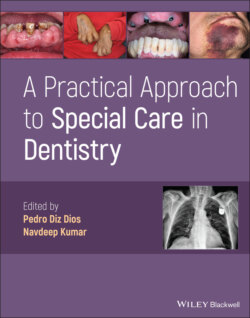Читать книгу A Practical Approach to Special Care in Dentistry - Группа авторов - Страница 237
Dental Management
ОглавлениеThe dental treatment plan will be determined primarily by the level of hypothyroidism control and the presence of comorbidities (Table 5.2.1)Table 5.2.1 Considerations for dental management.Risk assessmentMyxoedema coma can be triggered under stressful conditions caused by dental treatmentAssess the presence of comorbidities such as hypotension, hypoadrenocorticism, anaemia, cardiac arrythmias, ischaemic heart disease and von Willebrand diseasePotentially increased bleeding riskPotentially delayed wound healing due to decreased metabolic activity in fibroblastsCriteria for referralControlled hypothyroidism: dependent on comorbidities, dental care can be provided in the local dental clinic settingUncontrolled hypothyroidism: delay elective dental treatment until the hypothyroidism has been controlled; if urgent procedures are required, a hospital setting is preferableAccess/positionIf goitre is present, there may be pressure on the airway; consider a semi‐reclined positionIf there is a bleeding risk, arrange appointments earlier in the day and weekCommunicationLiaise with endocrinologist/physician if considering urgent dental treatment in a patient with untreated/significant hypothyroidismCognitive impairment is a common characteristic of congenital hypothyroidismSome patients can experience vision loss and/or hearing lossBradypsychia‐bradylalia has been reported in severe and long‐term hypothyroidismConsent/capacityPatients should be warned of the potential local (e.g. bleeding) and systemic complications (e.g. myxoedema coma), which can be triggered by dental treatmentConsider the impact of hypothyroidism on cognition and memoryAnaesthesia/sedationLocal anaesthesiaConsider risk of increased bleeding at the site of administrationSedationAvoid benzodiazepines such as diazepam and midazolam as they can trigger myxoedema comaGeneral anaesthesiaProcedures under general anaesthesia should be delayed until hormone levels have recoveredDental treatmentBeforeEnsure that the patient is compliant with their medical managementDetermine if there are any additional risks associated with the related comorbidities (e.g. anticoagulants due to arrhythmias)DuringCareful manipulation of soft tissues due to the bleeding and delayed healing riskAfterReduced bone turnover rate can increase the risk of radicular resorption secondary to orthodontic proceduresDrug prescriptionIncreased sensitivity to central nervous system depressants and barbiturates; avoid benzodiazepines and opioid analgesicsAvoid mouthwashes with povidone‐iodine (can increase the risk of thyroiditis or hypothyroidism)Education/preventionDue to their susceptibility to caries and periodontal disease, maintaining optimal oral hygiene and periodic professional dental reviews are a priority for these patients
